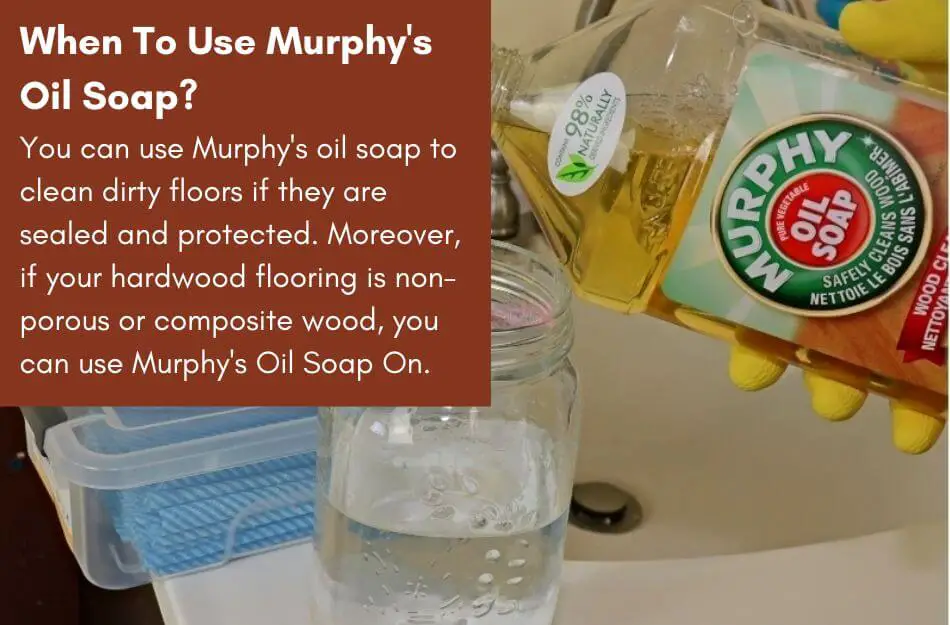I recently moved into a new apartment with beautiful tile floors. However, they were looking a bit dull and dingy. I remembered my grandmother swearing by Murphy’s Oil Soap for everything, so I figured it might be the perfect solution. But before I tackled the task, I wanted to be sure it was safe for my floors. Turns out, there’s more to consider than just the soap itself!

Image: flooringflow.com
So, can you use Murphy’s Oil Soap on tile floors? The answer is: It depends. While Murphy’s Oil Soap does a great job of cleaning and restoring wood floors, it’s not a one-size-fits-all solution for all tile types. Let’s dive into the details to see if your floors are a good match for this classic cleaning solution.
Understanding Tile Types and Their Cleaning Needs
Tile floors are a popular choice for homes because they’re durable, easy to clean, and come in a wide range of styles. However, not all tiles are created equal. Some tile types react differently to cleaning agents, including Murphy’s Oil Soap.
For example, unglazed tiles like natural stone (e.g., slate, marble, travertine) are more porous than glazed tiles. This means they’re more susceptible to stains and damage from harsh chemicals. Glazed tiles, which have a protective layer of ceramic coating, are generally more resistant to stains and abrasive cleaners.
Murphy’s Oil Soap and Tile: A Closer Look
Murphy’s Oil Soap is a gentle, all-natural cleaner made from vegetable oils and soap. While effective on wood floors, it’s not designed for all tile types. Here’s why:
Natural Stone Tiles: The oils in Murphy’s Oil Soap can leave a residue on porous natural stone tiles, attracting dirt and creating a slippery surface. This residue can also dull the natural shine of the stone.
Glazed Tiles: Glazed tiles are generally safe to clean with Murphy’s Oil Soap. However, it’s crucial to test a small, inconspicuous area first to ensure the soap doesn’t affect the glaze.
Sealed Tiles: Whether you’re dealing with natural stone or glazed tiles, it’s essential to consider whether they’re sealed. Sealing creates a protective barrier on the tile surface, making it less porous to stains and water. Many manufacturers recommend cleaning sealed tiles with a pH-neutral cleaner rather than a soap-based product like Murphy’s Oil Soap.
Grout: Murphy’s Oil Soap can effectively clean grout but use caution, as it can also penetrate the grout and make it appear darker or dirty. To avoid this, use a diluted solution, rinse thoroughly, and consider using a dedicated grout cleaner for stubborn stains.
Tips for Using Murphy’s Oil Soap on Tile Floors
If you decide to use Murphy’s Oil Soap on your tile floors, here are some tips to help ensure a safe and effective cleaning experience:
- Always test a small, inconspicuous area first. This will help you assess the soap’s effect on your tile and grout without risking damage to a large area.
- Dilute the soap. Use a ratio of 1/4 cup Murphy’s Oil Soap to 1 gallon of warm water. This will prevent the soap from leaving a residue on the tile.
- Avoid excess soap. Too much soap can leave a sticky residue. Rinse thoroughly with clean water after cleaning.
- Use a microfiber mop. Microfiber mops are designed to absorb water and dirt effectively. They’re also less likely to scratch your tile floors.
- Consider a grout cleaner for stubborn stains. Murphy’s Oil Soap may not effectively remove all types of grout stains. Use a dedicated grout cleaner for tougher messes.
Remember that even if your tile type is suitable for Murphy’s Oil Soap, it’s crucial to check the manufacturer’s cleaning recommendations. These recommendations provide the most accurate guidance for caring for your specific tile.

Image: www.mytidycorner.com
FAQs on Using Murphy’s Oil Soap on Tile Floors
Here are some frequently asked questions about using Murphy’s Oil Soap on tile floors:
What about other wood floor cleaners?
While Murphy’s Oil Soap is primarily marketed for wood floors, other wood floor cleaners might not be suitable for tile floors. These cleaners often contain ingredients that can dull or damage the surface of your tiles.
Can I use Murphy’s Oil Soap on bathroom tile?
It’s best to avoid using Murphy’s Oil Soap in bathrooms. The soap can leave a film on the tile and grout, which can trap moisture and potentially lead to mold and mildew growth.
Is Murphy’s Oil Soap safe for grout?
Murphy’s Oil Soap can clean grout but avoid overusing it. It’s best to use a dedicated grout cleaner for stubborn stains.
What are some alternatives to Murphy’s Oil Soap for cleaning tile floors?
If you’re unsure about using Murphy’s Oil Soap on your tile floors, consider these alternatives:
- pH-neutral cleaner: These cleaners are specially formulated for tile and will not damage the surface.
- White vinegar: Dilute white vinegar with water for a gentle cleaner that’s effective against stains and grime.
- Baking soda paste: Mix baking soda with water to create a paste for cleaning stubborn stains.
Can You Use Murphy’S Oil Soap On Tile Floors
Summing It Up:
While Murphy’s Oil Soap is a popular choice for wood floors, remember that not all tile types are compatible with this all-natural cleaner. Prioritize your tile type, whether it’s sealed or not, and always consult the manufacturer’s cleaning recommendations. If you’re unsure, a pH-neutral cleaner or a mixture of white vinegar and water are safe alternatives.
Are you interested in learning more about cleaning different types of tile floors? Let me know what you’d like to explore in the comments section!



/GettyImages-173599369-58ad68f83df78c345b829dfc.jpg?w=740&resize=740,414&ssl=1)


